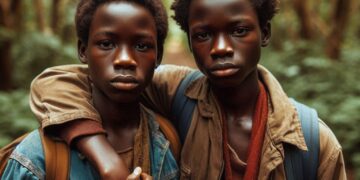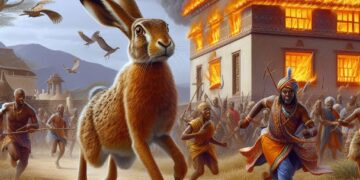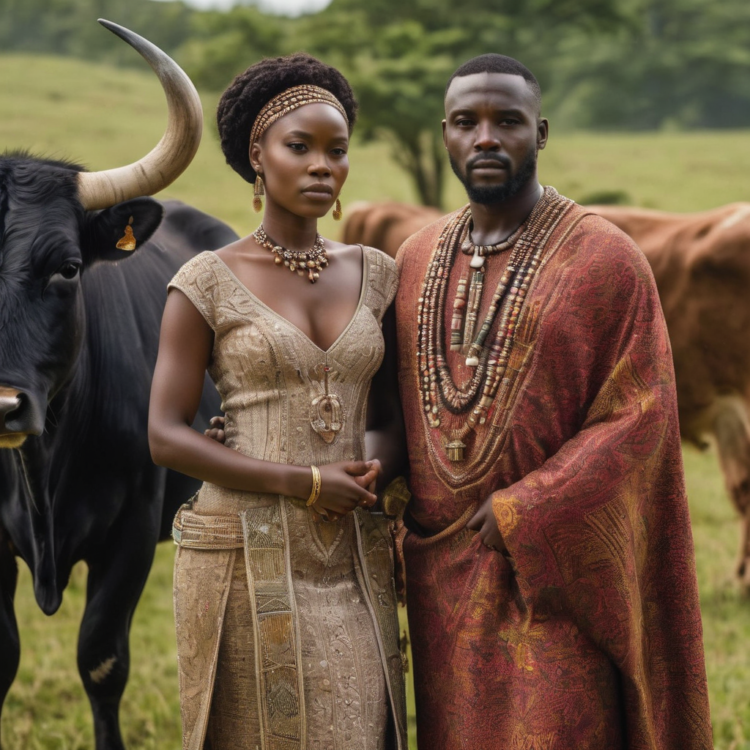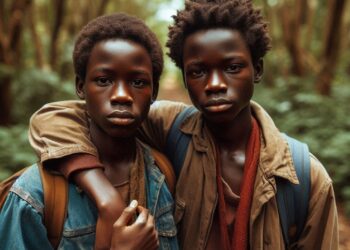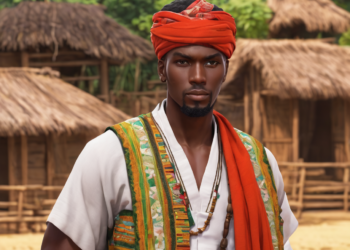Prologue: The Celestial Divide
In the beginning, the heavens and earth were divided, each a mirror to the other. Ruhanga, the supreme deity, watched over the heavens, a realm of eternal light, where joy was boundless and sorrow unknown. Below, the underworld was a place of shadows, inhabited by those who had fallen from grace—souls burdened by their past, striving to find redemption in a harsh world.
Among Ruhanga’s children was Isaza, a being of light and curiosity. The stories of the underworld, of its struggle and survival, stirred something deep within him, a yearning to understand the unknown. Despite warnings, he ventured into the shadows, his heart heavy with anticipation and fear.
Chapter 1: Isaza’s Fall
Isaza’s first breath in the underworld was thick with the scent of earth and decay. The air was heavy, a stark contrast to the ethereal lightness of the heavens. He wandered through villages where the people bore the weight of their existence on their faces—lines of hardship etched into their skin, eyes dulled by endless toil.
Amidst this, Isaza met Nyamata, a princess whose eyes, though shadowed by sorrow, sparkled with an inner light. Her beauty was not merely physical; it was a strength born of suffering, a resilience that captivated Isaza’s very soul. He felt his divine essence waver, drawn to this world of raw emotion and tangible reality.
As days turned to weeks, Isaza found himself unable to leave. The allure of the underworld, the love he felt for Nyamata, anchored him in a place that was not his own. When their son, Isimbwa, was born, Isaza felt a profound mix of joy and despair—a love so deep it pained him, for he knew he could never return to the heavens.
Chapter 2: Isimbwa’s Return
Isimbwa grew up in a world that was neither fully his father’s nor his mother’s. He was a child of two realms, torn between the divine legacy of his father and the earthly resilience of his mother. The stories of the heavens whispered to him in dreams, filling him with a longing he could not ignore.
When he reached adulthood, the call of his ancestors became too strong. His heart ached to see the world above, the land his father had left behind. His departure from the underworld was bittersweet—he kissed his mother’s tear-streaked face, promising to return, though knowing in his heart he might not.
The journey to the surface was arduous, filled with trials that tested his strength and resolve. When he finally emerged into the light, the world above was not as he had imagined. The kingdom of his ancestors was in ruins, its throne usurped by Bukuku, a man whose heart had long been hardened by fear and greed.
Chapter 3: Nyinamwiru’s Sorrow
Bukuku’s fear of losing power consumed him. He knew his claim to the throne was tenuous, held together by the force of his will and the loyalty of those he had cowed into submission. The prophecy that a true heir would one day rise to claim the throne haunted him, twisting his mind into paranoia.
Nyinamwiru, his only daughter, was the embodiment of that fear. She was beautiful, a beauty that Bukuku saw as a threat. In a desperate attempt to defy fate, he ordered her disfigurement, believing that by making her undesirable, he could prevent any man from fathering a child with her—a child who might fulfill the prophecy.
The day she was imprisoned and mutilated was the day Nyinamwiru’s soul was shattered. Alone in the darkness, she wept for the life she had lost, for the future that had been stolen from her. But within her, a spark of defiance remained, a quiet strength that refused to be extinguished.
Isimbwa, wandering the kingdom, discovered Nyinamwiru in her prison. When he first saw her, he was struck not by her scars, but by the light in her remaining eye—a light that spoke of pain endured, but not defeated. His heart ached for her, a deep, soul-crushing sorrow mixed with a fierce determination to save her.
Their escape was frantic, filled with moments of terror and fleeting hope. When they finally found safety, their love was not a passionate flame but a deep, abiding connection, born of shared suffering and mutual understanding. When their son Ndahura was born, he was a symbol of that love—a beacon of hope in a world steeped in darkness.
Chapter 4: The Fury of Bukuku
Bukuku’s fury upon discovering the birth of his grandson was a storm that tore through the kingdom. His paranoia reached new heights, his mind consumed by the need to eliminate this threat. He ordered a search for the infant Ndahura, his eyes wild with the fear of the prophecy coming true.
The moment Ndahura was captured was one of utter despair for Nyinamwiru. She pleaded with her father, her voice breaking with the weight of her grief, begging him to spare her child. But Bukuku’s heart had long been closed to such pleas. He believed that by killing the boy, he could finally secure his throne.
As Ndahura was thrown into the river, Nyinamwiru screamed, a sound that echoed through the heavens and earth—a cry of a mother’s love, of pain so profound it tore at the very fabric of existence. But the gods, moved by her anguish, intervened. The boy’s umbilical cord caught on a branch, and a porter, moved by pity, saved him from the waters.
Chapter 5: The Cave of Miracles
Ndahura’s life was spared, but his fate was still uncertain. The porter, unable to care for him, hid him in a cave, praying for a miracle. The gods, not yet done with their intervention, made the cave’s walls sprout with breasts, dripping milk to sustain the child. These breasts, known as “Amabeere ga Nyinamwiru,” became a symbol of divine compassion and the enduring power of a mother’s love.
In that cave, Ndahura grew, nourished by the gods themselves. As he matured, the sorrow and loss of his early life were replaced by strength and determination. He emerged from the cave not just as a man, but as a force of nature, ready to claim the destiny that was his by birth.
Chapter 6: The Reckoning
As a young man, Ndahura joined the herdsmen of the kingdom, blending into the life of the common folk. But his true nature could not be hidden for long. When the lion killed Bukuku’s prized cow, Bihogo, the kingdom was thrown into chaos. Bukuku’s rage was a fire that threatened to consume all in its path.
Ndahura, knowing that his time had come, did not flee. Instead, he walked into the heart of the storm, confronting the man who had tried to kill him as a child. In the dead of night, he slipped into the palace, his heart pounding with the weight of his ancestors’ spirits.
When he finally stood before Bukuku, he felt not fear, but a deep, cold resolve. The moment he drove the spear into Bukuku’s back, time seemed to stand still. Bukuku’s eyes, filled with shock and recognition, met Ndahura’s. In that gaze, the past and present collided—the realization that the prophecy had been fulfilled, that his downfall had come at the hands of his own blood.
Ndahura’s voice, when he declared his identity, was steady, filled with the power of generations. With one final act, he ended Bukuku’s reign, claiming the throne that was rightfully his.
Chapter 7: The Reign of Ndahura
Ndahura’s ascent to the throne was met with joy and relief by the people, who had long suffered under Bukuku’s tyranny. His rule brought prosperity and peace, as the kingdom flourished under his leadership. But the shadows of his past never fully left him.
As king, Ndahura expanded the kingdom’s borders, bringing innovations that transformed the region. But in quiet moments, he would remember the cave where he had been saved, the mother who had wept for him, and the father who had sacrificed everything to bring him into the world.
In the end, Ndahura chose to leave the throne, retreating to the mystical crater lakes, where the spirits of his ancestors whispered to him, calling him home. His legacy lived on, not just in the kingdom he built, but in the hearts of the people who remembered the boy who had defied death, the king who had bridged the gap between heaven and earth.
Epilogue: The End of the Batembuzi
Ndahura’s disappearance marked the end of an era, but his story lived on, passed down through generations. His son Wamala ruled in his place, but the kingdom faced new challenges. Disease and migration weakened the once-great empire, paving the way for the rise of the Babiito.
Yet, even as the Batembuzi dynasty faded, the tale of Ndahura remained—a story of love and loss, of strength and sacrifice, of a king who was born of two worlds, and who left his mark on both.

